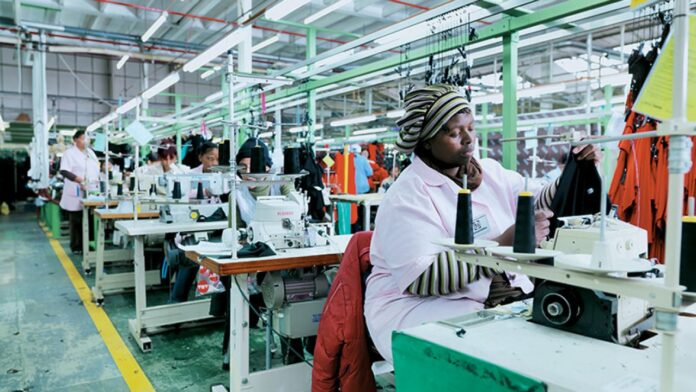The Manufacturers Association of Nigeria (MAN) has described some manufacturing components such as investments, employment, production value, capacity utilisation as uptick for the first half of 2022.
Mr Segun Ajayi-Kadir, Director-General, MAN, made this known in a statement on Friday in Lagos.
Ajayi-Kadir said manufacturing capacity utilisation increased to 57.9 per cent (year-on-year) in the first half of 2022 from 52.2 per cent recorded in the same half in 2021; thus, indicating 5.7 per cent point increase over the period.
However, he noted that it declined by 1.1 per cent (half-on-half) from 59 per cent recorded in second half of 2021.
According to him, the oscillatory and sub-optimal capacity utilisation of the sector in the period under review aligned with the risks and difficulties posed by the lingering effect of COVID-19 pandemic and the adverse impact of the Russian-Ukrainian war.
“However, notwithstanding the challenges in the period, more capacities came up in the cable sub-sector with the commencement of optical fibre production by Coleman technical industries, the first of its kind in the whole of ECOWAS region,” he said.
The MAN DG stated that manufacturing sector factory output value increased to N3.99 trillion in first half of 2022 (year-on-year) up from N3.66 trillion recorded in the same half in 2021; thus, indicating N0.33 trillion or 9.0 per cent increase over the period.
He noted that production was strongly hampered by lack of foreign exchange for importation of raw materials in all the sectoral groups, safe for food sub-sector which had undergone a significant level of backward integration.
Ajayi-Kadir stressed that the N10 increase of excise duty on non-alcoholic drinks grossly affected production in that segment of the sector.
“In addition, the implementation of migration of National List to Chapter 99 of ECOWAS Common External Tariff (CET) is perverse with bureaucracy and complexities among Government agencies, leading delay in getting raw materials to factories.
“Specifically, the basic metal group are heavily challenged by the lowering of duty to annealed cold roll to 5 per cent from the previous 45 per cent, which made domestic manufacturing of the product uncompetitive.
“Also, activities in the motor cycle assembly sub-sector was severely affected following the suspension of motor cycles in some areas across states, particularly in Lagos.
“Moreso, the increase in the duty of paper from 5 to 20 per cent adversely affected productivity in the paper products sub-sector in the period under review,” he said.
Ajayi-Kadir added that the sector’s investment upticked to N178.39 billion (year-on-year) in the first half of 2022 from N144.14 billion recorded in the corresponding half of 2021; thus, indicating N34.25 billion or 23.7 per cent increase over the period.
He said 8543 jobs were created in the first half of 2022 as against 7602 jobs recorded in the corresponding half of 2021 and 8508 in the second half of 2021.
According to him, the marginal increase in jobs created is due to positive and continuous adjustments in manufacturing activities to accommodate the current economic hardship and sustain production by manufacturers.
He, however, stated that cost of lending to manufacturers increased to 23.5 per cent (year-on-year) up from 19 per cent of the corresponding half in 2021, while electricity supply from the national grid to the sector degenerated in the period under review.
“Although, average daily supply to the sector increased to 12 hours in the first half 2022 from 11 hours of the second half of 2021, the average number of outage per day increased to 6 times from 3 times recorded in the preceding half.
“The poor power supply from the grid fueled self-energy generation among manufacturers as expenditure on alternative energy source soared to N67.77 billion in the first quarter of 2022 (year-on-year) up from N32.18 billion recorded in the first half of 2021 and N45.04 billion of the second half respectively,” he said.
He added that unsold inventory of finished products steepened to N187.08 billion in the first half of 2022 down from N214.83 billion recorded in the first half of 2021; thus, indicating N27.75 billion or 12.9 per cent decline.
Also, local raw materials utilisation steepened to 52 per cent in the first half of 2022 down from 53 per cent of corresponding half in 2021; thus, indicating 1 per cent decline.
“The manufacturing sector is generally faced with limited investment in domestic production of raw materials for utilisation in most of the sub-sectors, which is as result of limited funding and policy incentives in the country.
“The basic industrial chemical sub-sector faced severe inactivity in the first six months of 2022 due to lack of domestic production of basic chemicals.
“This therefore, demands for the need to resuscitate the local refineries to encourage investment in petrochemical development in the country,” he said.




